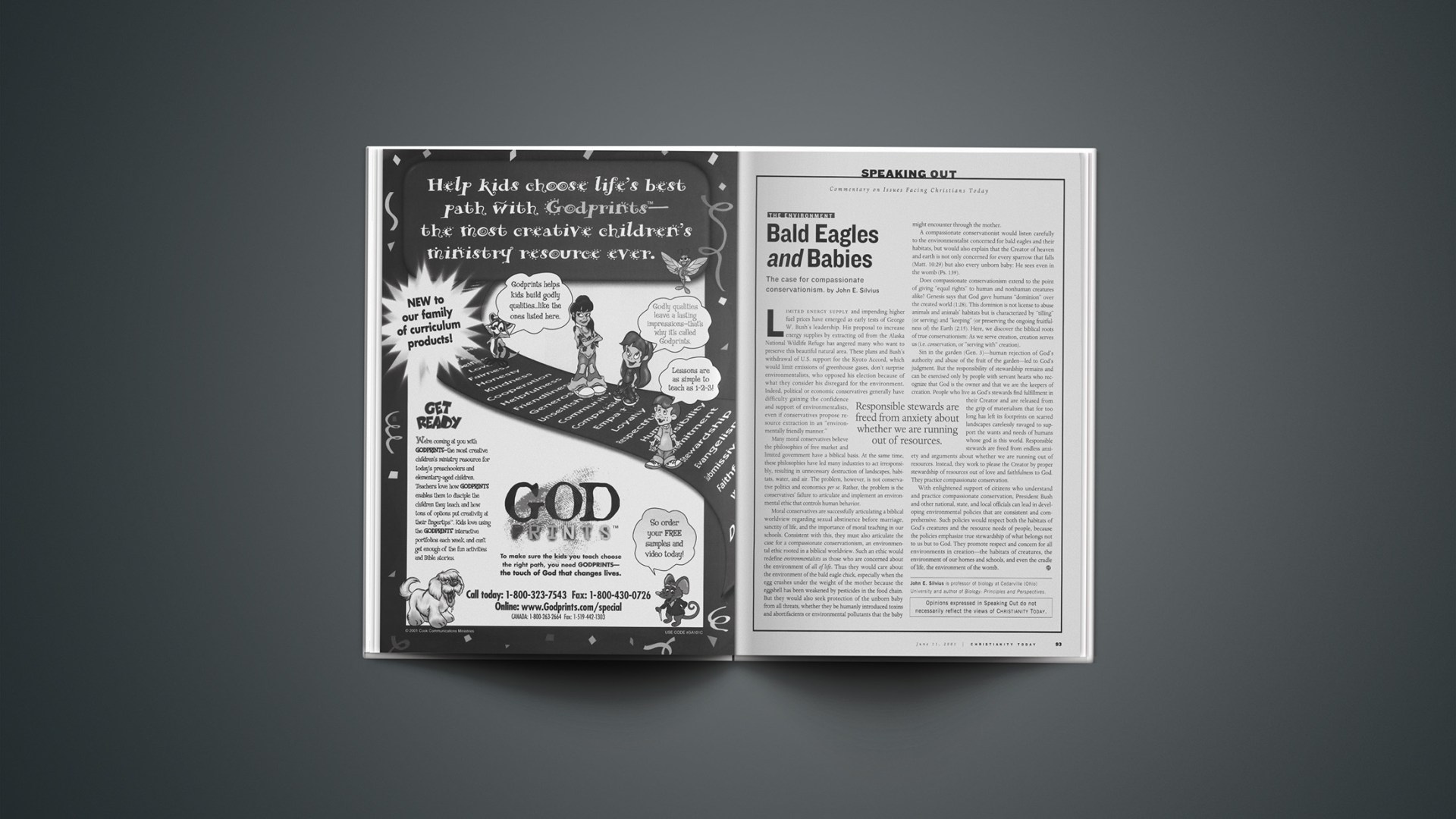Many moral conservatives believe the philosophies of free market and limited government have a biblical basis. At the same time, these philosophies have led many industries to act irresponsibly, resulting in unnecessary destruction of landscapes, habitats, water, and air. The problem, however, is not conservative politics and economics per se. Rather, the problem is the conservatives’ failure to articulate and implement an environmental ethic that controls human behavior.
Moral conservatives are successfully articulating a biblical worldview regarding sexual abstinence before marriage, sanctity of life, and the importance of moral teaching in our schools. Consistent with this, they must also articulate the case for a compassionate conservationism, an environmental ethic rooted in a biblical worldview. Such an ethic would redefine environmentalists as those who are concerned about the environment of all of life. Thus they would care about the environment of the bald eagle chick, especially when the egg crushes under the weight of the mother because the eggshell has been weakened by pesticides in the food chain. But they would also seek protection of the unborn baby from all threats, whether they be humanly introduced toxins and abortifacients or environmental pollutants that the baby might encounter through the mother.
A compassionate conservationist would listen carefully to the environmentalist concerned for bald eagles and their habitats, but would also explain that the Creator of heaven and earth is not only concerned for every sparrow that falls (Matt. 10:29) but also every unborn baby: He sees even in the womb (Ps. 139).
Does compassionate conservationism extend to the point of giving “equal rights” to human and nonhuman creatures alike? Genesis says that God gave humans “dominion” over the created world (1:28). This dominion is not license to abuse animals and animals’ habitats but is characterized by “tilling” (or serving) and “keeping” (or preserving the ongoing fruitfulness of) the Earth (2:15). Here, we discover the biblical roots of true conservationism: As we serve creation, creation serves us (i.e. conservation, or “serving with” creation).
Sin in the garden (Gen. 3)—human rejection of God’s authority and abuse of the fruit of the garden—led to God’s judgment. But the responsibility of stewardship remains and can be exercised only by people with servant hearts who recognize that God is the owner and that we are the keepers of creation. People who live as God’s stewards find fulfillment in their Creator and are released from the grip of materialism that for too long has left its footprints on scarred landscapes carelessly ravaged to support the wants and needs of humans whose god is this world. Responsible stewards are freed from endless anxiety and arguments about whether we are running out of resources. Instead, they work to please the Creator by proper stewardship of resources out of love and faithfulness to God. They practice compassionate conservation.
With enlightened support of citizens who understand and practice compassionate conservation, President Bush and other national, state, and local officials can lead in developing environmental policies that are consistent and comprehensive. Such policies would respect both the habitats of God’s creatures and the resource needs of people, because the policies emphasize true stewardship of what belongs not to us but to God. They promote respect and concern for all environments in creation—the habitats of creatures, the environment of our homes and schools, and even the cradle of life, the environment of the womb.
John E. Silvius is professor of biology at Cedarville (Ohio) University and author of Biology: Principles and Perspectives.
Copyright © 2001 Christianity Today. Click for reprint information.
Related Elsewhere
Outside magazine profiled Christian environmentalism past, present, and future, and suggested that religious activists will be extremely important in the Bush administration.A Christian Century editorial said society can either tell God “we’re in charge of sea level from here on out, or we can throttle back and learn to live a little differently.”
Bush’s environmental policies came under fire after only two months in office, according to the Chicago Tribune.
In TheNew York Times, head of Environmental Protection Agency claimed critics have been too quick to denounce early administration decisions.
President Bush’s nominees for environmental policy jobs were lawyers and lobbyists, according to the Los Angeles Times.
Bush’s clean air proposal was released just as polls said he was weak on the environment, The Boston Globe reported.
America’s Roman Catholic bishops have called for immediate action to find solutions to global climate change saying that fighting it is a moral duty. A Boston Globe editorial looked at global warming’s spiritual cost.
Christian Environmentalism associations include Christian Environmental Council (an offshoot of the Evangelical Environmental Network), the Interfaith Council for Environmental Stewardship, Evangelicals for Social Action and Green Cross.
Amazon.com offers John E. Silvius’s book, Biology: Principles and Perspectives.
For more articles, see Yahoo’s full coverage areas on environment news.
Earlier Christianity Today articles on environmentalism include:
Religious Leaders Rebuke Bush Administration Over Kyoto Protocol | Officials from the National Council of Churches, Presbyterian Church (USA), United Methodist Church, Disciples of Christ, and African Methodist Episcopal Church say U.S. must limit greenhouse gas emissions. (April 6, 2001)
Unholy Harvest? | Evangelicals join protests against genetically modified “frankenfoods.” (May 9, 2000)
U.S. Churches Join Global Warming Debate (Oct. 5, 1998)
God’s Green Acres | How Calvin DeWitt is helping Dunn, Wisconsin, reflect the glory of God’s good creation. (June 15, 1998)
Greening of the Gospel? | Evangelical environmentalists press to add creation care to the church’s mission. (Nov. 11, 1996)
Evangelical Environmentalism Comes of Age (Nov. 11, 1996)










